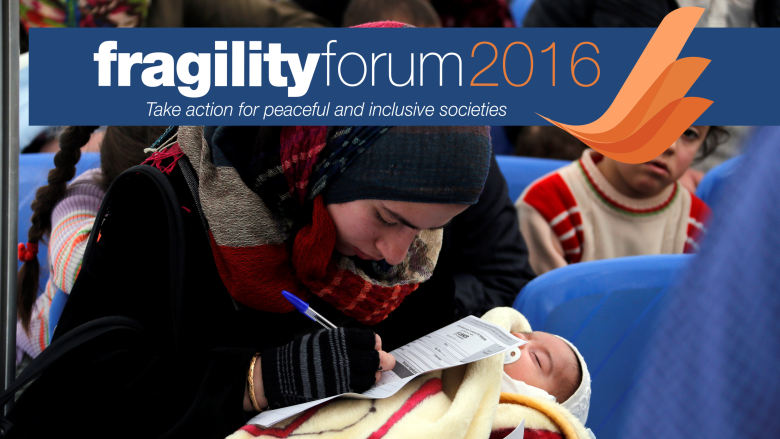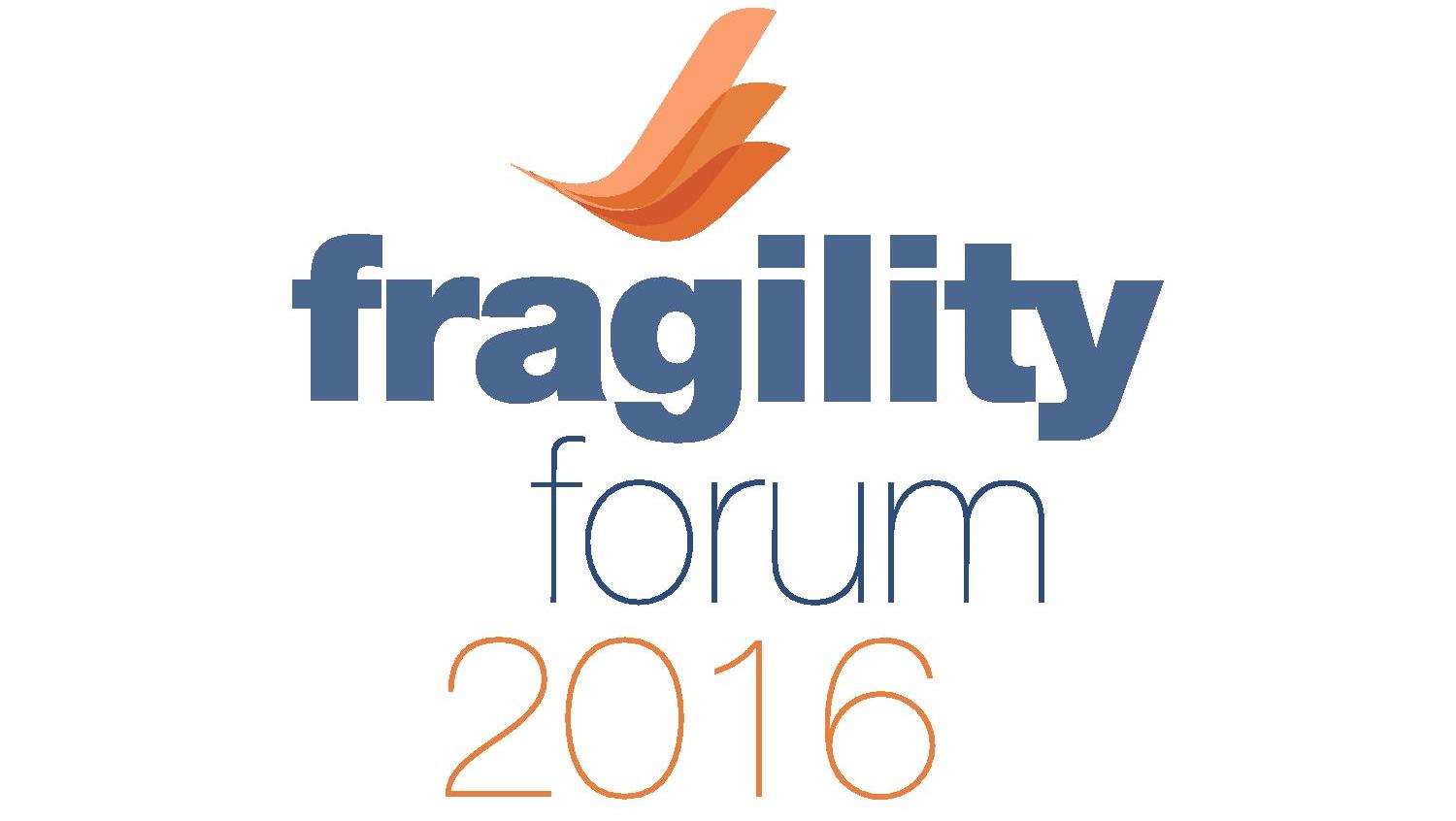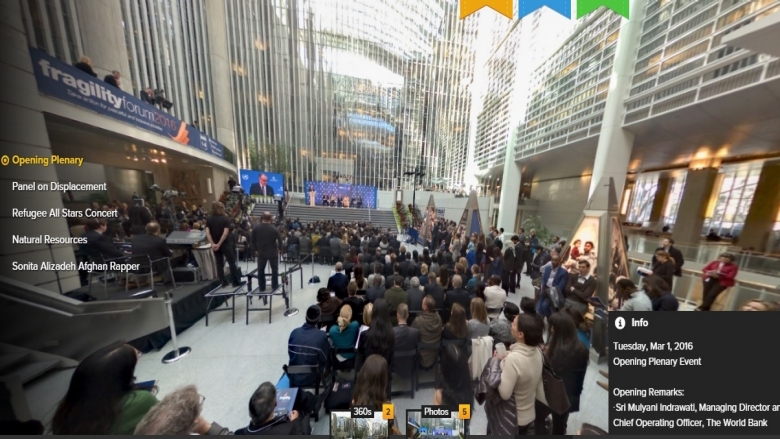Download the Full Program
Highlights
Leaving No One Behind in Fragile States [World Bank Live]
March 1, 9:00 am-10:00 am, Atrium
In collaboration with the United Nations
How can we push forward the sustainable development agenda and reduce poverty in a world affected by fragility, conflict and violence? Inspired by Sustainable Development Goal 16 – peace, justice and strong institutions – this year’s Fragility Forum focuses on making progress in the post-2015 era, with an opening panel of distinguished leaders to discuss what it takes to turn the ambition of 17 goals and 169 targets into reality in conflict-affected and fragile states.
Speakers:
- Opening Remarks: Sri Mulyani Indrawati, Managing Director and Chief Operating Officer, The World Bank
- Jim Yong Kim, President, The World Bank Group
- Catherine Samba-Panza, President, Central African Republic
- Jan Eliasson, Deputy Secretary-General, United Nations
- Nancy Lindborg, President, United States Institute of Peace
- Moderator: Saroj Kumar Jha, Senior Director, Fragility, Conflict and Violence, The World Bank
Strengthening the Global Response to Forced Displacement [World Bank Live]
March 1, 10 am-11:10 am, Preston Auditorium
As the Syrian refugee crisis galvanizes attention, forced displacement has emerged as a growing development challenge which requires close collaboration between humanitarian and development partners. In the run up to the World Humanitarian Summit, this high level panel brings together perspectives from development agencies, governments and voices of the displaced to explore how the international community can take collective action to help both the displaced and host communities, in support of the sustainable development agenda.
Speakers:
- Opening Remarks: Kyle Peters, Senior Vice President, Operations, The World Bank
- HRH Princess Sarah Zeid of Jordan, Chair, Every Woman Every Child Everywhere
- Deng Majok-gutatur Chol, co-Founder and Executive Director of the Lost Boys and Girls of Sudan
- Mohamed Omer Arteh, Deputy Prime Minister, Somalia
- Thomas Staal, Acting Assistant Administrator, USAID
- Elizabeth Ferris, Senior Adviser to the UN General Assembly’s Global Summit on Refugees and Migrants
- Ali Sindi, Minister of Planning, Kurdistan Regional Government, Iraq
- Moderator: John Donnelly, Communications Advisor, Office of the President, The World Bank
Sierra Leone Refugee All Stars Concert and Reception
March 1, 5:30 pm-6:30 pm, Atrium
Refugee All Stars, a vibrant band formed by a group of refugees displaced to Guinea during their country’s 10-year civil war, has gained recognition for bringing the plight of refugees to the global stage, showing how music can help cope with trauma and life in camps from their own experience. Be inspired!
Performers:
- Reuben Koroma (lead vocals, congas)
- Ashade Pearce (lead guitar, vocals)
- Jahson Bull (rhythm guitar, vocals)
- Dennis Sannoh (bass guitar, vocals)
- Makengo Kamara (djembe, vocals)
Back to Business: How the Private Sector Can Help Transform Fragile and Conflict Situations [World Bank Live]
March 2, 9:00 am-10:15 am, Atrium
In collaboration with World Economic Forum
The 2015 Nobel Peace Prize awarded to the Tunisian Quartet underscored the importance of the private sector in development, shedding light on its emerging role in actively building stability in fragile and conflict affected areas. Taking inspiration, this event brings together four unique perspectives—government, local business, multinational company, and impact investor—to share lessons learned, explore complementarities, and improve coordination to catalyze investment and boost business in fragile environments.
Speakers:
- Opening Remarks: Philippe Le Houérou, Executive Vice President and CEO, International Finance Corporation
- Wided Bouchamaoui, 2015 Nobel Peace Prize Winner – Tunisian National Dialogue Quartet; President of the Tunisian Confederation of Industry, Trade and Handicrafts
- Kaifala Marah, Minister of Finance and Economic Development of Sierra Leone; Chair of the g7+
- Guillaume Le Cunff, President, Nespresso USA
- Laure Wessemius-Chibrac, Managing Director, Cordaid Investments
- Closing Remarks: Elissa Golberg, Assistant Deputy Minister of Foreign Affairs, Trade and Development of Canada
- Moderator: Beverly Kirk, Fellow and Deputy Director for Outreach, International Security Program; Program Manager, Smart Women, Smart Power, CSIS
Democratic and Inclusive Leadership to Prevent Violent Extremism
March 2, 10:15 am-11:30 am, Preston Auditorium
In collaboration with Club de Madrid
In the last two years, the international media has been dominated by images of Kalashnikov-wielding fighters steadfastly advancing over large swaths of territory, butchering and destroying in their path. It is easy to get the impression that ‘violent extremism’ (VE) is something utterly new, and that emerged out of nowhere. Yet, extremist ideologies and the violence they engender have a long history. What’s more, courageous people – mothers, faith leaders, youth activists – have been working tirelessly for decades at the frontlines to prevent further violence and respond to the needs of vulnerable groups. Women and men have led this struggle making a genuine commitment to practising democratic values and human rights, open and accountable government, and respect for the rights of minorities. The Club de Madrid, an organization of former Presidents and Prime Ministers from democratic countries has been working for years to promote these principles through its work on building inclusive and Shared Societies and its recent effort to raise a Global Consensus to countering and preventing violent extremism. The aim of violent extremists is to polarize society and a Shared Societies perspective also helps to prevent that happening and to redress the situation if it does occur. This high-level panel considers the lessons learned on how inclusive enabling leadership and policies can facilitate and amplify the voices of local leaders and practitioners that are often not heard in debates over violent extremism, in order to learn from their experiences and generate ideas about how development actors can operate more effectively in places where extremism is present or threatened.
Speakers:
- Danilo Türk, Former President of Slovenia; Club de Madrid Member
- Mehdi Jomaa, Former acting Prime Minister of Tunisia; Club de Madrid Member
- Dewirini Anggraeni, Mothers School Project, Indonesia
- Imam Mohamed Magid, Dulles Area Muslim Society, Adams Center
- Makhtar Diop, Regional Vice President, Africa, The World Bank
- Moderator: Jean-Marie Guéhenno, President and CEO, International Crisis Group (ICG)
Envisioning Reconstruction for Stability in the Middle-East
March 3, 9:00 am - 10:30 am, Preston Auditorium
In collaboration with Brookings Institute
While conflict rages on in the Middle-East, reconstruction may seem a far-off concern. Yet experience tells us that a new vision for the region needs to be forged well in advance for post-conflict stability to be sustainable. Thinking beyond physical infrastructure, rebuilding institutions, establishing governance mechanisms, and finding more effective ways for regional collaboration will be essential. How can development and international communities support these efforts? Approaches to political settlements, governance, humanitarian and development interventions will be explored to begin establishing building blocks that can bring diverse regimes and communities together.
Speakers:
- Mohamed Al-Maitami, Minister of Plan and International Cooperation, Yemen
- Shantanayan Deverajan, Chief Economist, Middle East and North Africa Region, The World Bank
- Walid Abdelwahab, Director, Infrastructure Department, Islamic Development Bank
- Bruce Jones, Vice President, Foreign Policy, The Brookings Institute
- Beverley Warmington, Asia Director, Department for International Development, UK
- Tamara Cofman Wittes, Director, Center for Middle East Policy, The Brookings Institute
- Moderator: Alexandre Marc, Chief Technical Specialist, Fragility, Conflict and Violence, The World Bank
Managing Contracts and Concessions of Natural Resources in Fragile Situations
March 3, 9:30 am-11:30 am, MC 13-121
In collaboration with African Development Bank
This panel will provide a platform to discuss the management of concessions and contracts in Africa to ensure African countries benefit from them; and how African countries can manage such contracts and concessions within the context of complex and unequal trade/investment challenges. Panelists will provide experiences of African governments, private sector, and international organizations. Support to member states through the Africa Legal Support Facility will also be highlighted.
Speakers:
- Linah Mohohlo, Governor, Central Bank of Botswana
- Winnie Byanyima, Executive Director of Oxfam International
- Ed Garcia, President and Managing Director, Firestone Liberia
- Jay Pendergrass, Vice-President, Environmental Law Institute
- Fabrice Nze-Bekale, CEO, Societe Equalitoriale des Mines
- Janvier Litse, Vice-President, Regional Operations, African Development Bank
- Stephen Karangizi, Director, Africa Legal Support Facility, African Development Bank
- Moderator: Callisto Madavo, Visiting Professor, African Studies Program, Georgetown University
From Crisis to Development – The Future of Humanitarian Financing
March 3, 11:30 am-12:30 pm, MC 13-121
In a world of risks and global crises, it is expected that 125 million people will need humanitarian assistance this year alone, straining the humanitarian system. How will the international community cope? While additional resources are needed to meet growing challenges, the focus must also be on leveraging innovation and finding efficiencies to make the most of available resources. In this event, experts and decision makers from the public and private sector will discuss innovative and additional financing options to address rising humanitarian needs. It will also explore how development and humanitarian actors can best work together and adapt their policies, tools and instruments in situations of fragility, conflict and violence.
Speakers:
- Jan Walliser, Vice President for Equitable Growth, Finance, and Institutions, The World Bank
- Aamir A. Rehman, Managing Director, Fajr Capital Group
- Amara Konneh, Minister of Finance, Liberia
- Izumi Nakamitsu, Assistant Secretary-General, Assistant Administrator and Director Crisis Response Unit, United Nations Development Programme (UNDP)
- Louise Savell, Director, Social Finance
- Beverley Warmington, Director, Conflict & Humanitarian, DFID
- Moderator: Colin Bruce, Senior Adviser to the President and Designated IASC Principal, The World Bank
Special Performance: Sonita Alizadeh Afghan Rapper – Campaign to End Forced Child Marriage
March 3, 12:30 pm-1:30 pm. Preston Auditorium
Sonita Alizadeh, Afghan rapper, brings her campaign to end forced child marriage to the Fragility Forum. Growing up in Iran after her family fled Taliban rule, Sonita herself escaped a marriage her parents had planned for her through her music, inspired by Iranian and American rappers. Her story is documented in the music video “Brides for sale,” which brought international attention to this cause.
Speakers:
- Welcome Remarks: Robert Saum, Country Director, Afghanistan, The World Bank
- Closing Remarks: Quentin Wodon, Lead Economist, Education, The World Bank
- Moderator: Ozong Agborsangaya-Fiteu, Senior Operations Officer, Fragility, Conflict and Violence, The World Bank
Closing Plenary: Hard Talk with World Bank Vice-Presidents
March 3, 4:30 pm-5:30 pm, Atrium
Speakers:
- Jorge Familiar, Regional Vice President, Latin America and Caribbean, The World Bank
- Annette Dixon, Regional Vice President, South Asia (via VC), The World Bank
- Makhtar Diop, Vice President, Africa, The World Bank
- Nena Stoiljkovic, Vice President, IFC Advisory Services
- Keith Hansen, Vice President, Human Development, The World Bank
- Moderator: Kyle Peters, Senior Vice President, Operations, The World Bank
Closing Remarks & Reception – Half the Sky
March 3, 5:30 pm-6:00 pm. Atrium
- Wided Bouchamaoui, 2015 Nobel Peace Prize Winner – Tunisian National Dialogue Quartet; President of the Tunisian Confederation of Industry, Trade and Handicrafts
- Honorable Aissata Toure Diallo, Mali; Member of Parliament
- Honorable Sultana Mismari, Libya; Member of Parliament
- Honorable Asiya Nasir, Pakistan; Member of Parliament
- Honorable Stella Ngwu, Nigeria; Member of Parliament
- Honorable Clara Rojas, Colombia; Member of Parliament
- Honorable Susan Wasuk, South Sudan; Member of Parliament
- Chair: Saroj Kumar Jha, Senior Director, Fragility, Conflict and Violence, The World Bank
The Members of Parliament listed are part of the USAid-supported Global Women’s Leadership Program, brought together by the National Democratic Institute, and the Women in Parliaments Global Forum.
Last Updated: Mar 03, 2016



